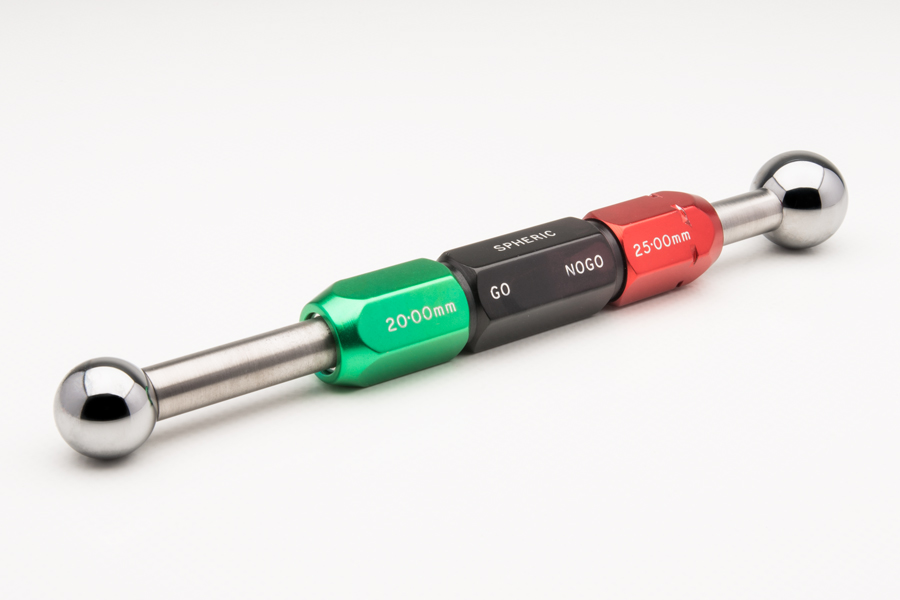Home > Products > Plug Gauges > Ball Plug Gauges

Our Ball plug gauges are manufactured from Tungsten Carbide balls and supplied on single or double end handle, these can be supplied at +/-0.001mm or as per go, no go gauge standard tolerances.
Ball plug gauges are ideal for measuring in tight spaces and blind holes. One advantage of them is that are quicker and easier than conventional inspection methods as they can be inserted at any angle. Surface roughness can be easily detected as there is a very small contact area of the balls, using only the equator of the ball surface.
They are also very effective in detecting a bell mouth or taper in the hole.
Among others, ball gauges are used by bearing manufacturers when checking the bearing housing inner and outer racer or in the electronics PCB market for checking rivet holes.
| Go: +0.002mm | No Go: -0.002mm | Go: +0.00008” | No Go: -0.00008” |
| Go: +0.001mm | No Go: -0.001mm | Go: +0.00004” | No Go: -0.00004” |
| Go: +0.0005mm | No Go: -0.0005mm | Go: +0.00002” | No Go: -0.00002” |
| Gauge Size | Stem Ø x Length | Braze or Pin & Bond | Protrusion GO | Protrusion NOGO |
|---|---|---|---|---|
| Ø1.0 - Ø1.3 | Ø0.8 x 25mm | Braze | 15mm | 10mm |
| Ø1.3 - Ø1.8 | Ø1.0 x 25mm | Braze | 15mm | 10mm |
| Ø1.8 - Ø2.4 | Ø1.65 x 25mm | Braze | 15mm | 10mm |
| Ø2.4 - Ø3.0 | Ø2.0 x 40mm | Braze | 32mm | 20mm |
| Ø3.0 - Ø4.0 | Ø2.38 x 40mm | Braze | 32mm | 20mm |
| Ø4.0 - Ø5.0 | Ø2.38 x 50mm | Braze | 40mm | 32mm |
| Ø5.0 - Ø7.4 | Ø3.0 x 50mm | Pin & Bond | 40mm | 32mm |
| Ø7.5 - Ø10 | Ø4.0 x 50mm | Pin & Bond | 40mm | 32mm |
| Ø10 - Ø15 | Ø6.0 x 50mm | Pin & Bond | 44mm | 35mm |
| Ø15 - Ø20 | Ø9.5 x 60mm | Pin & Bond | 50mm | 40mm |
| Ø20 - Ø25 | Ø11 x 60mm | Pin & Bond | 57mm | 44mm |
| Ø28+ | Ø13.5 x 80mm | Pin & Bond | 100mm | 80mm |
Plain stem ball, single and double ended plug gauges are manufactured using Tungsten Carbide precision balls. The balls are brazed or spark eroded depending on the ball sizes.
The stem is manufactured from high-quality Stainless Steel and applied to a handle, engraved with their sizes and colour coded end nuts. Green for go, red for no go.
Balls below 4mm will only be brazed to the stem, 4mm and above will have a pin & adhesive bond.
Accuracy is our trademark at TN UK. We pride ourselves on our ability to measure and calibrate the products we manufacture. Housing some of the most sophisticated equipment in the world, our annually assessed UKAS lab means we guarantee the precision of the products we supply.
On top of that, we maintain regular and open communication directly with you and any relevant departments to ensure that you get exactly what you need when you need it.
We also offer a recalibrate service for your existing gauges, CMM Reference balls and Master Ball Sets. So you can rest assured that, whether we are supplying a new product or recalibrating an existing one, by meeting our strict standards, your company meets its strict standards (particularly important for other calibration assessed companies).
Ball plug gauges is a precision Tungsten Carbide ball product that can be used by an engineer to make quick checks on the sizes of holes, or a spacing within a workpiece. As they can be used by hand and give immediate feedback they can be used quickly, yet provide an accurate measure.
Ball gauges are a very widely used product so there are many specific uses. In general terms, they are precision balls used to measure that a hole, or spacing, has been accurately machined to the desired size. When the ball gauge is put into a hole it should fit snugly (within a defined tolerance) and not have room to rattle around.
With a double ended ball gauge you have a go and no go end. This allows you to further check the tolerance of a machined hole or spacing as the go end of the ball gauge should fit perfectly, whereas the no go end should not fit. If the no go end does fit the hole has been made too large. For a specific example of use, the aerospace industry use ball gauges, they are used to check that rivet holes are the correct size before assembling aerofoils.
The advantage of a ball plug gauge over a standard plug gauge is that it can be inserted at any angle to check the accuracy of a hole or spacing. A standard plug gauge, which works in the same way (with a go and no-go end) is basically a pin or rod that can only be inserted into a straight hole. A ball plug gauge however can be put into an actual hole at various angles and manoeuvred. This means they are more versatile while still being incredibly accurate.